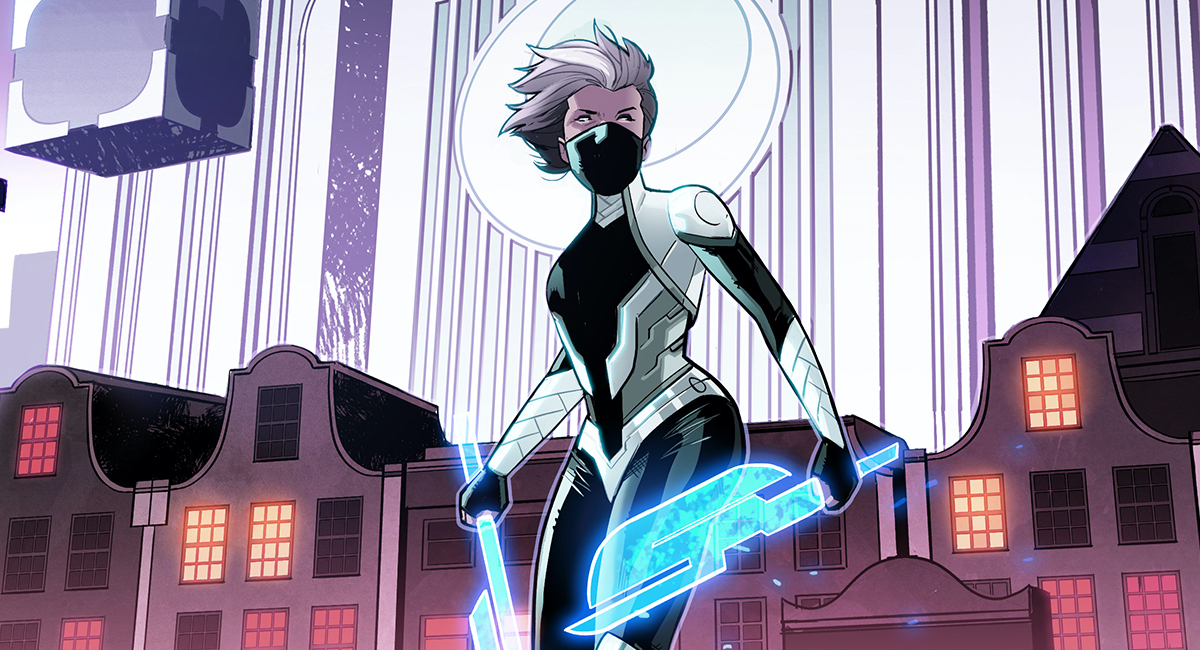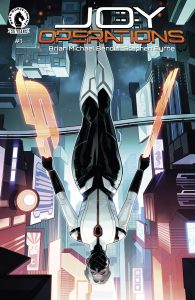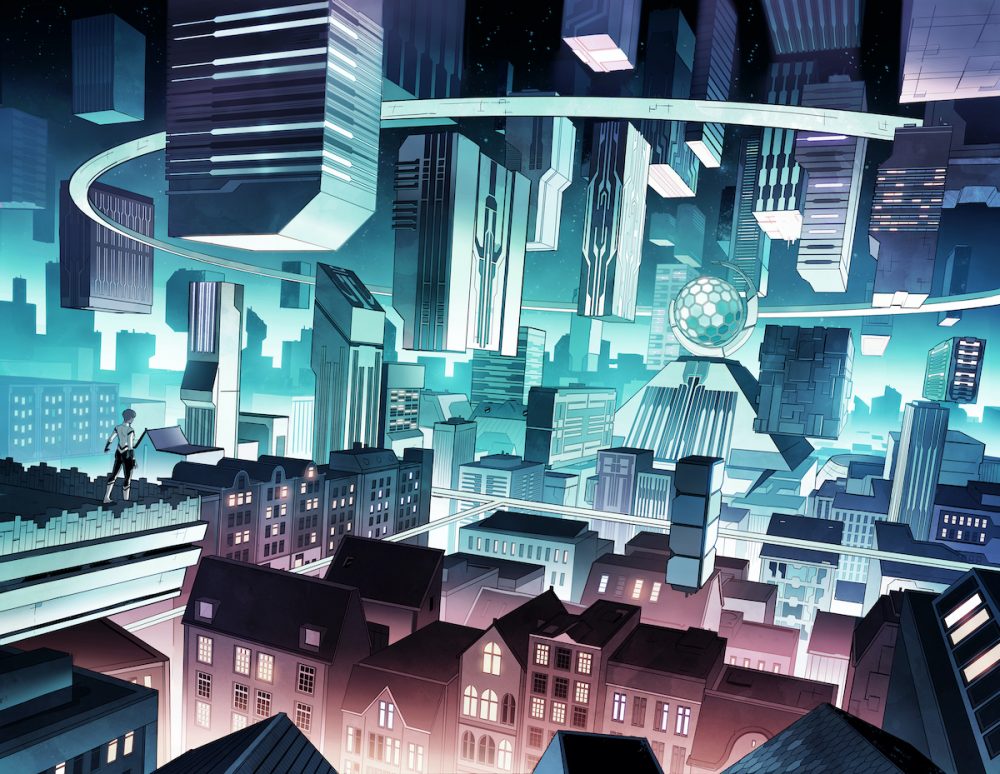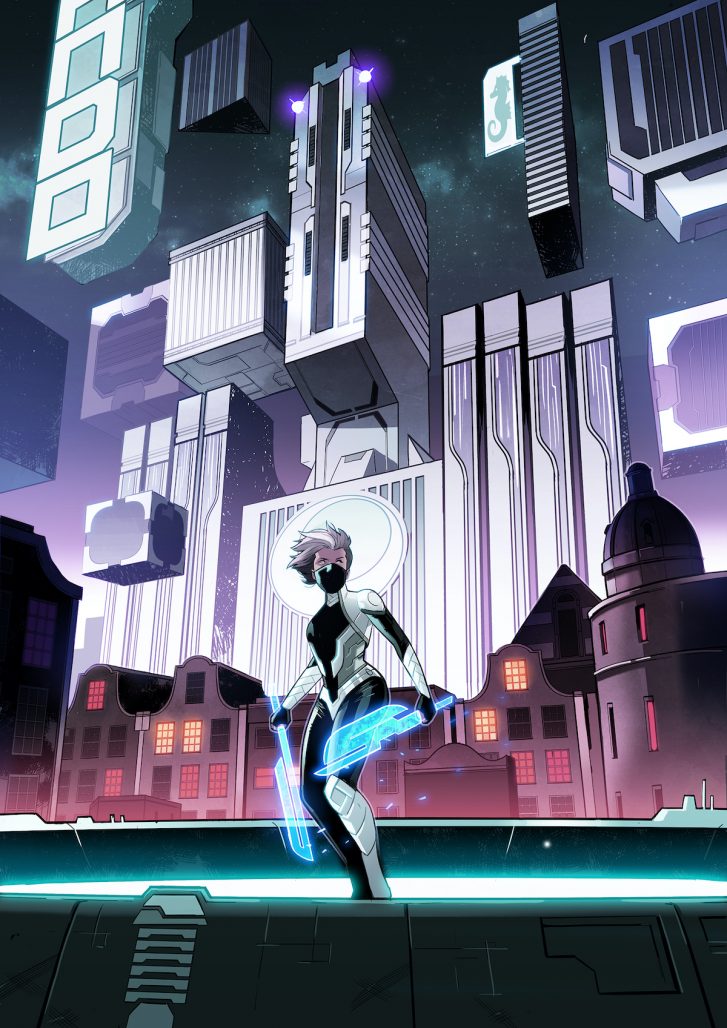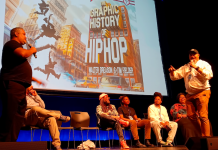Last month The Beat presented the first part of an interview with writer Brian Michael Bendis, in which we discussed Bendis’s recently-announced move of the Jinxworld imprint to Dark Horse Comics. The first new Jinxworld title coming from Dark Horse is the sci-fi adventure series Joy Operations. Written by Bendis and illustrated by Stephen Byrne, Joy Operations follows Joy, a highly-trained operative working for the Jonando Trust, a corporate-owned city in a future that’s less than a century from now.
The series is the first full-length collaboration between Bendis and Byrne; the two previously worked together on an issue of Legion of Super-Heroes, and Bendis helped DC recruit Byrne to work on Wonder Twins for the Wonder Comics imprint. It’s also the first foray into a straight science-fiction story for Bendis. The Beat spoke with the writer about the inspiration for Joy Operations, his collaboration with Byrne, and how he’s using the freedom of creator-owned work to try new things narratively and structurally.
Joe Grunenwald: Is Joy Operations the most ‘hard sci-fi’ book that you’ve ever written?
Brian Michael Bendis: Yes, I’ve been dancing around this for a while, but this is all in. This is me challenging myself. For some reason, this genre is a genre I’m personally very finicky about, like more finicky about sci-fi than any other genre, including genres I’ve dedicated large portions of my life to. You would think if someone is heavily into crime fiction that they’re very finicky about other people’s crime fiction, right? But I find myself being more, I wouldn’t say forgiving, but more open to things in those genres. Where in sci-fi, I get very, very finicky and upset at certain tropes and certain ideas and certain things they do over and over again. And I’m the only one that’s upset about them, but I want to see what happens if I apply my philosophies about this stuff to this brand new world that we’re building. So that is what I’m offering. It is sci fi, it is fun, it is hopefully a very, very fun place to visit, but the idea is to try as many new things as we can.
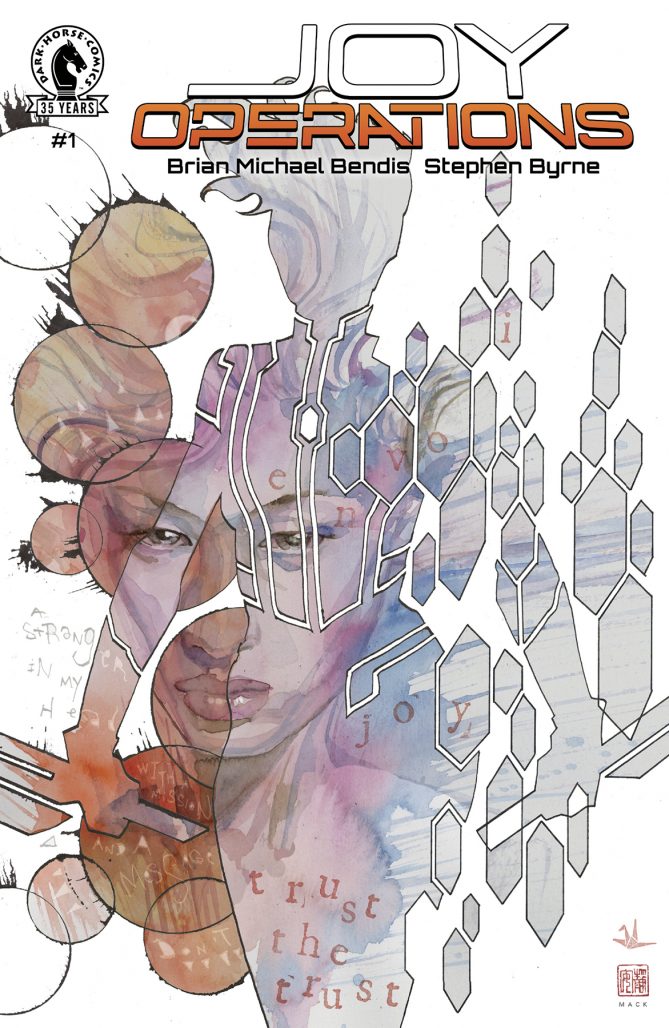
Grunenwald: Gotcha. What was the process on this? Did you and Stephen decide that you wanted to work on something, and then you came up with this all together? Or was this an idea that you had and you thought, ‘Hey, I think Stephen will be good for this.’
Bendis: Kind of both things simultaneously. We were working on Wonder Comics and Stephen was doing Wonder Twins, and we had hired him based on his Instagram and other things that I just, every time I pull up Instagram — I’m sure you have this with other artists as well, I’m sure a lot of people know what this feeling is — there’s certain voices that every time to see the work, no matter what it is, it just gets to you. You just feel something, right? Even when it’s just little, like, cartoon baby Winter Soldiers that he draws. I love them. And I was like, I know enough of myself to know, ‘Oh no, you want to work with this person, that’s that feeling.’ And then while Wonder Twins and the Wonder Comics were going the whole time I was like, ‘Just look at him, he’s killing it. Every page better than the next.’ And then I found, it was never on purpose, but every time I ask someone to work on Legion of Super-Heroes with me, it feels like I literally put them to the edge of a deep pool and push them in. It just feels like you’re like you’re asking the most of everybody just by the definition of the of the franchise. So I threw him into the deep end on Legion of Super-Heroes to see what would happen and he killed it. And then I was like, ‘That’s it, we’re doing something together.’ And we started cooking this.
And at the same time, there was some stuff going on with another franchise that I don’t want to say what it was, but I was so sure that this franchise was heading this direction that I kept thinking about it all the time. And then I found out through the grapevine the franchise is never going to head in the direction I thought it was going, ever. But I kept thinking about it. And it was over and over and over again, like more than I was thinking about stuff I was writing and then I wrote down, like, ‘Why are you thinking about this so much? Oh, you’re creating something, you’re trying to build something, and you’re doing that thing where, yeah, you wanted this. You wanted this other sci-fi franchise to go in this direction, and it didn’t, and it’s not. That means you want to do it.’ Though you will never recognize what that is based on Joy. You will never even get a hint of what it is. If I told you you’d be like, ‘no way,’ and I’m not gonna tell you ’cause I don’t wanna tell you.
Having that impetus as a stepping stone to build a world for Joy — I knew who Joy was and I knew what I wanted to do with the character, and that’s the most important thing. But to build a world around her that lets us reflect what we wanted to do with the character, that got very exciting. And then also, there’re certain things you see in sci-fi, and then you’re like, ‘Oh, we’re still going to have those things in the future? It seems like we wouldn’t have them anymore.’ Like, we almost don’t have them now. And I wanted to remove them from the world to see what the world would be like. Like cars, it seems like, eventually, we’ll be done with them. Like, I know people like them, but they’re not helping. Like, there’s a better way to do this, and if we don’t have them, what do we have? And then building from there. It’s just a lot of fun. It a lot of fun to do just ground-level world-building and seeing that, everywhere you go, what’s the thing I haven’t seen before? What’s the thing that would surprise and delight me either story-wise or design-wise? And then Stephen and I came together at the ground level, with that kind of thought process. Like, ‘What what can we do to push everything into a place and, at the same time, still be fun?’
Grunenwald: So it sounds like, did you come up with Joy, and then sort of build the world of Joy Operations around her? How did that work?
Bendis: It happened simultaneously, which made me so happy because you can’t really control whether that happens or not. Sometimes, you do have a character, and you need to build something around them so you can express this character’s truth, and sometimes you have a world or a premise, and there’s nobody in it to make it special and fun. And by the way, we’ve seen professional storytelling that’s had both of those things, and and how bad they feel, right? So having the opportunity to build her knowing exactly what the premise of the world is, allowed us to have her place in it.
Now also, there’s something that goes down with Joy. We meet her not at some great moment of heroism, but the book opens when she’s already in trouble. The premise of the book happens on page 1, because it doesn’t reveal what it is until page 12, and then by page 12, hopefully you’ve been delightfully tricked a couple of times narratively. And then when we get to what’s really going on, you’re in it with Joy, you’re fully invested with her and her plight. I’m sorry I’m being so vague. But I’m hoping I can surprise as many people as possible with what we we’re trying. I ran it by so many of my friends. ‘Has anyone ever tried this?’ And they’re like, ‘Oh, no, I don’t think so. Not exactly like that.’ So I’m hoping to surprise and delight people with something new and fun. But if I tell everybody what it is I kind of ruin it, so it’s a bummer to promote.
Grunenwald: I was gonna mention that. You do some really fun storytelling tricks and sort of use readers expectations.
Bendis: Have you seen the book?
Grunenwald: I’ve read the first issue.
Bendis: Oh, thank you. I’m sorry I’m talking so vague.
Grunenwald: No, that’s okay. We can be vague for the interview audience, that’s fine.
Bendis: But you can at least say, ‘he’s not being a jerk. He really does have a surprise he wants this share with you narratively, and if I say it, it does kind of ruin it, right? I don’t want to do it.
Grunenwald: Yeah, no, I wouldn’t say what it is because I didn’t expect it, and it got me. It was really nicely done.
Bendis: Thank you. It makes my whole day, I appreciate that. It’s also, listen, it’s not brain surgery, but it’s nerve-racking to put new stuff out in the world. It’s nerve-racking to debut new things. You know, it just is. It’s just, you’re showing, you know, whole parts of yourself and things you really believe in, and you want to share them with people and it’s always scary. I actually thought at this point it wouldn’t be. I thought you grow up and eventually you callus up. But no, it is always nerve-racking.
Grunenwald: I think that’s a sign that you care about what you’re doing. If you stopped feeling that way, it would mean that you don’t care anymore.
Bendis: I absolutely keep telling myself that, thank you.
Grunenwald: With the storytelling tricks in the first issue, are you making a conscious effort to try new stuff like that? And just to generally sort of try to push the form forward?
Bendis: Well, I always try to, but what you don’t want to do is hurt the story, right? Like you can try new things all day, but then you don’t know the story we’re telling. So it’s a beautiful balance that you’re looking for, almost on everything. But yeah, the answer is yes. And also, you know, as you get older there are certain things about certain genres where you see people announcing books – and I’ve done it, too – where you’re like, ‘It’s a world full of superheroes.’ ‘Yeah, but you didn’t invent superheroes. Someone else invented superheroes. What did you invent?’
And so, with creator-owned, it feels like it’s almost an obligation to really try to invent as many new things, small things, big things as you can. And as I age, I’ve realized more and more that the things I’m most proud of are the things where I’ve done that, if that makes sense. There’s a lot of things that I can look back on fondly, but when I’m really, really, wholeheartedly proud of myself and my collaborators is when we’ve found something no one else found.
Grunenwald: Is there anything else that you want to say about Joy Operations? I keep wanting to call it ‘Joy Division.’ Did you ever call it ‘Joy Division?’
Bendis: [laughs] No, but I’ll make it even better. See, it used to be Joy Division, now I can’t look at the title without thinking ‘Smooth Operator.’ I wish that was a joke.
We talked about it a little bit but, you know, what Stephen has accomplished in this book is something else. It’s one of those times, I keep showing the art to other artists, and other artists are completely blown away. There’s some stuff that only other artists can see right away. I’m so honored to be part of that collaboration. He’s given it his all and I’m just excited to be part of that. And I often think back on my early buys at Dark Horse like Hard Boiled when it looked like everyone was just, like, getting out of the way to unveil Geof Darrow‘s work and the beautiful world that he created. I feel the same way about this book. It’s all of us just getting out of the way to show with Stephen can do.
Joy is a character I feel very deeply about, and with any new character, just like we did with Jessica Jones or Scarlet, it takes a few issues for us to really peel the onion. So in the first issue you see we start fast, but by issue three we’re really going to show you what makes her tick and why this world is a place I’ve spent my whole pandemic in, When we announced it, immediately people started ordering it, and I was so moved by the trust, and I took that very seriously. And I’m very excited to show everybody what we have to earn that trust.
Published by Dark Horse Comics, Joy Operations #1 (of 5) arrives in stores and digitally on Wednesday, November 17th. The preorder cutoff date for the issue is Monday, October 25th.



